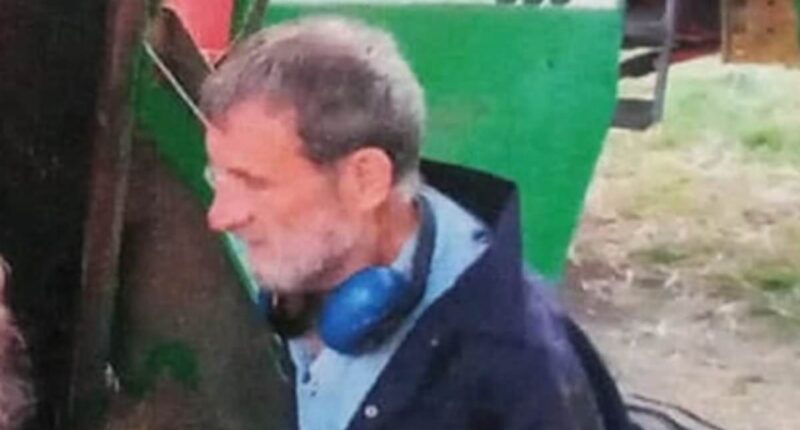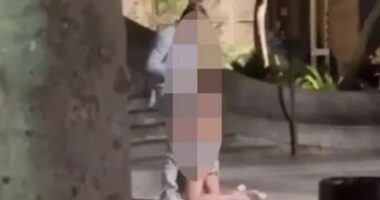A farmer killed himself the day before Rachel Reeves’ budget because he was ‘worried’ about Labour’s inheritance tax raid, a coroner has found.
John Charlesworth, 78, ‘wasn’t going to let the government beat him’ and wanted to pass on the farm ‘on his terms’, an inquest heard.
After the ruling of suicide, the family called on the government to reconsider the unpopular policy, which will apply to farms valued at over £1 million starting from next year.
Mr. Charlesworth, who worked as a farmer his entire life and was an enthusiastic church bell ringer, was discovered dead on his farm in Silkstone, Barnsley, South Yorkshire, on October 29, the day before Ms. Reeves presented her budget.
Despite facing challenges in caring for his wife Carolyn, 74, who suffered from dementia and later passed away in a care facility four months after him, his son Jonathan and daughter Verity expressed their belief that he would still be alive if it weren’t for the “financial concerns related to inheritance tax.”
Concluding the inquest in Sheffield, Coroner Tanyka Rawden said: ‘He had caring responsibilities and was worried about the implementation of the new form of inheritance tax which could see the family lose 50 per cent of their farm, ultimately causing him to take his life the day before the changes were due to be announced.’
Speaking outside Sheffield Coroner’s Court, Verity Charlesworth, 45, urged the government to rethink the inheritance tax raid. She said: ‘It’s not too late to change before someone else loses their life like my dad.’

John Charlesworth in years gone by tending to his animals on the family farm near Barnsley

Mr Charlesworth’s children Verity, left, and Jonathan, right, with family friend Paul Denton
Jonathan Charlesworth, 47, who took over the running of the farm prior to his father’s death so he could care for his wife, gave a message to the Chancellor, saying: ‘If she’d have been here, I would have hoped she would have listened to the evidence. I’d tell her to go out and visit other farms, see them working for £3.50, £5 an hour.
‘Government policy caused my dad’s death and will no doubt cause more before the tax change comes in in 2026.
‘I wish my dad hadn’t done it, no land is worth that sacrifice, but it will happen again.
‘The policy really wants abolishing or adjusting somehow. At the very least, they need to extend the implementation date. Eighteen months is not long-enough.’
He added: ‘It was good to hear the coroner agreed with what we already knew, that it was the inheritance tax that really ended my father’s life. If it wasn’t for that, he would still be here.’
Jonathan had earlier told the inquest his father knew his wife of 51 years’ condition had worsened to the point she did not have long left.
He said: ‘He was certainly having thoughts he would be able to go back to doing stuff on the farm and go back to bell ringing’.
But he added that ‘for the six weeks before (his death) the only thing he would ever talk about was inheritance tax and how he was going to deal with it.
‘He became very down about the financial burden which could be imposed.’
But Jonathan added: ‘He wasn’t going to let the government beat him, he wanted (to leave the farm) on his terms and no one was going to take that away from him.’
‘He thought he was doing it for the greater good of us.’

Distraught son Jonathan Charlesworth, who keeps 40 cows and 120 sheep at the farm
The inquest heard Mr Charlesworth, known to family and friends by his middle name, Philip, had last spoken to his son at 7pm the previous evening. Both lived in neighbouring houses on the farm.
Jonathan found his father in a barn early the next morning after receiving a worried phone call from his uncle and he was pronounced dead at the scene.
A post mortem examination found the cause of death was hanging.
Mr Charlesworth’s GP, Dr Matthew Teesdale, said he had ‘minimal contact’ with the surgery apart from treatment for hypertension and atrial fibrillation, a heart condition.
‘There was no documented history of mental health issues or suicidal thoughts prior to his death, Dr Teesdale added.
Mr Charlesworth had contact in the days before his death with a mental health team concerning support to help him care for his wife.
They recorded he needed support to ‘help him cope with his wife’ and was feeling ‘anxious’ but had ‘no suicidal thoughts’. A further visit was planned.
But Verity said: ‘It’s not something he would say, that he was anxious’.
Her brother added: ‘It had got to the stage where he admitted he needed some help (but) he was talking about having a bit of freedom if my mum went’.
Jonathan added: ‘I believe my dad took his own life the day before the budget because he believed this would beat the government’s inheritance tax proposals and save the farm for future generations.
‘It’s very sad he believed he would have to take his own life to save his farm.’
After Mr Charlesworth’s death, a note entitled ‘till death do us part’ was found at his home setting funeral plans including a poem, his ashes to be scattered in woodland, and for ‘no sad songs’ or church services.
He had also left a separate note with instructions about the future of the farm and referring to inheritance tax.
Paying tribute to her father, Verity told how farming was ‘very much a defining part of his identity’.
Mr Charlesworth, from a farming family and who went to agricultural college, had been with Carolyn since they met while she was at a teaching college 52 years earlier.
The couple, accompanied by their daughter, were regular bellringers at Silkstone Church, with Mr Charlesworth being tower captain.
‘He was a grandfather of six and loved to involve (his grandchildren) with jobs on the farm. He was loved by many and will be sadly missed.’
Jonathan said he had ‘taught me everything I know about farming’ and would do ‘anything for anyone’.
He previously accused the Prime Minister of having ‘blood on his hands’ over the government’s inheritance tax raid on farmers.
His father ran a 70-acre farm on the outskirts of Barnsley, South Yorkshire, which had been in his family since the 1950s.
But pre-budget news predicting the tax raid – ending the practice of allowing farmers to pass on estates without inheritance tax – had ‘eaten away’ at him and was the ‘final straw’, his son said.
Clive Bailye, who runs The Farming Forum website, said: ‘Without a doubt this case is not unique. I’m aware of others which haven’t got to inquest stage yet. It’s a big problem.
‘A farm is a lifetime’s work. It’s not like losing a job or any other business. To see it potentially lost is like having a child taken away.
‘The government should ideally scrap this policy, otherwise review it or at the very least delay it.
‘A lot of the older farmers in their 70s or 80s haven’t got the time left to plan for it.
‘There are worries that, heading to the April 2026 deadline, an awful lot of other people are considering similar action.’

The tax grab has seen farmers hold a series of protests including in Parliament Square

Farmers held placards denouncing the government for the impact of tax changes on the sector
Gareth Wyn-Jones, among the leaders of farmers’ protests against the IHT tax grab, said: ‘This case is absolutely tragic. It could have been something which didn’t have to happen. There could be a lot more of them.
‘The government needs to 100 per cent scrap this policy.’
Meanwhile, Lib Dem MP Alistair Carmichael, who chairs the environment, food and rural affairs select committee, added his name to the pleas for a policy rethink.
Describing Mr Charlesworth’s death as ‘absolutely heartbreaking’, he said: ‘My deepest condolences go out to the Charlesworth family.

Alistair Carmichael, who has urged Rachel Reeves to reconsider her tax changes
‘There has been a growing mental health crisis for years amongst farmers. Concerns for mental health was just one of the reasons for which the select committee recently called on the government to pause the implementation of their planned inheritance tax changes and to start again.
‘This is a concern that goes across the political divide. Our committee has a Labour majority – seven out of 11 members are Labour MPs – but we produced a unanimous report.
‘It is possible to reform the tax in a way that doesn’t put farmers (especially older farmers) under this sort of pressure while still catching the super-rich who buy up land, not to farm it but to shelter their wealth from inheritance tax.’
The National Farmers’ Union said its ‘thoughts and heartfelt condolences are with the family of Mr Charlesworth’ – and that it had repeatedly asked minister to ‘think again about the human impact of this policy’.
A spokesperson said: ‘Whatever our differences on the family farm tax policy, we have repeatedly said to government that we don’t believe it intended this policy to have the invidious effect it has had on elderly farmers.
‘Over the past ten months, both publicly and privately, we have repeatedly called for this government to think again about the human impact of this policy – and act.’
Speaking last October, Jonathan told the Daily Mail: ‘I’m not sure you could publish what I’d say to (Keir Starmer). He’s got blood on his hands.
‘He’s totally destroying an industry we rely on.’
Jonathan, who now looks after the 70-acre farm of sheep and cattle at Silkstone, in the Pennine foothills, himself, added: ‘This government has absolutely zero understanding of agriculture let alone how it works.
‘They think we’re just jumped-up millionaires riding around in Land Rovers but that’s not true.
‘This government have killed ambition in this country – what’s the point of doing well, building up a business, if it’s all going to be taken away?’

John Charlesworth had left a handwritten note referring to the inheritance tax change
Jonathan revealed his father spent his final hours writing down his thoughts on how to protect the future of his business from the government’s inheritance tax raid before taking his own life.
He found a handwritten note where the Yorkshire farmer had jotted down his ideas for how best to leave the farm to his children.
The musings, left on a clipboard immediately beneath a suicide note, included questions for the family’s solicitor covering costs, capital gains tax, protected agricultural exemptions and what gifted assets could be sheltered from inheritance tax under the seven-year rule.
On the budget, Mr Charlesworth had written: ‘Is it possible to execute before law changes’, and wondered ‘how long’ it would take for the policy to charge inheritance tax on farms worth over £1million to be implemented.
Jonathan said: ‘The suicide note was on top of the clipboard and this was underneath it.
‘That’s what he was working on before he went and did it. It’s fairly obvious what was on his mind.
‘He was very methodical, my dad. The police have taken the suicide note and I tried to give the note about inheritance to them as well. It’s got his workings out, how to save the farm from potential inheritance tax.’
Jonathan said his father wrote in the suicide note that he had ‘left some beers in the fridge’ for his son, adding: ‘I appreciate all the help and support you’ve given me.’
Further lines were written to his daughter, who is not involved in the farm, which has been in the family since 1957.
Although Mr Charlesworth sr was sole carer for his dementia-stricken wife Carolyn, who had to be placed in a home, his son said he was ‘talking more about inheritance tax lately than about caring for his wife’.

John Charlesworth was found after his son received a phone call from his worried uncle
Jonathan revealed he found his father after receiving a call from a family friend who had been unable to get hold of the pensioner on the phone.
He said his ‘first thoughts’ were shielding his youngest children – a son aged seven and daughter, nine, who live with him – from the tragedy, so called their mother to take them to her house before emergency services arrived.
Father-of-four Jonathan, who keeps 40 cattle and 120 sheep, said he still hopes to be able to leave the 70-acre farm to his children one day, with his youngest son particularly interested.
‘Even his teachers say all he ever talks about is farming and tractors. He’s like I was at that age,’ he said.
Although the farm, which also includes a small camp site and shepherds’ huts, is worth approximately £2million on paper, Jonathan’s income last year was under £15,000, equivalent to an hourly rate less than half the minimum wage.
He added: ‘I put in up to 60 hours a week, so that works out at less than £5 an hour and I only had four to five nights away with my partner.
‘I haven’t had a week’s holiday for 13 years – yet the government is asking farmers to fund the pay rises of train drivers, nurses and doctors and everyone else.’
‘The most I’ve ever made was £30,000 a year, when my dad was running the farm and I had another job.’

Jonathan Charlesworth said he earns the equivalent of less than half national minimum wage
Jonathan told how he has been left ‘numb’ and ‘exhausted’ by the tragedy – which he first revealed in an anonymous post on The Farming Forum website.
In the post, he wrote: ‘This morning I found my dad in the barn having taken his own life.
‘So afraid of the IHT implications on farms he took his own life rather than see the government take half the farm in IHT.
‘As a family, we are devastated and in shock! This is the human cost of government policy or potential government policy.
‘They claim to be for the working man, no man worked harder than dad. He increased the acreage from my grandad’s day and was proud of what he achieved.’
In the post, Jonathan also told he believed his father aimed to ‘beat the budget by ending his life’ and that it is what happens when ‘you have built something your entire life and see it robbed from beneath your kids’ feet’.
He said the family did not make enough money to pay a large inheritance tax bill, nor would they be able to borrow it.

Jonathan Charlesworth believes Chancellor Rachel Reeves should have had ‘better insight’ about the impact of her hated policy as her husband is a senior civil servant for DEFRA
Jonathan has called on farmers to protest instead by withholding their produce.
Calling on the government to rethink scrapping inheritance tax relief for farms worth over £1million – which campaigners say will lead to the break-up of family farms to pay death duties – he added: ‘Rachel Reeves’s husband Nicholas Joicey is Second Permanent Secretary at the Department of Food, Environment and Rural Affairs.
‘She should have better knowledge of what will happen as a result of this policy.’
The Government expects the new tax rules to raise an extra half a billion pounds by 2028/9.
The Treasury says just 27 per cent of farms will be affected, but the NFU says the true figure, based on analysis of DEFRA figures, is 66 per cent.
The new rules mean farmers can pass on £1 million of agricultural assets tax-free, in addition to exemptions for all inheritances – a £325,000 tax-free allowance, plus a further £175,000 for a main residence.
The Treasury argues this means most farmers can use all three and pass on £1.5 million of assets without tax – and if the farm is owned by a married couple, both are eligible for the exemptions. This would enable them to jointly pass on £3 million of assets.
However, critics have repeatedly warned that farming families who are asset-rich on paper will now not have enough money to cover the inheritance tax.
The Treasury defended its approach to changing farmers’ inheritance tax relief as ‘fair and balanced’.
A Treasury spokesperson said: ‘Our sympathies are with the loved ones of Mr Charlesworth and the farming community.
‘The vast majority of estates claiming these reliefs will still pay no additional inheritance tax, and those that do will pay a reduced rate and be able to pay over 10 years interest-free. This is a fair and balanced approach to help fix the public services we all rely on.’
Officials stressed that above the £1 million allowance, individuals will still access 50 per cent relief from inheritance tax and will pay inheritance tax at a reduced effective rate up to 20 per cent, rather than the standard 40 per cent, while two people with farmland can pass on up to £3 million without paying any inheritance tax.
For confidential support contact The Samaritans on 116123.

















